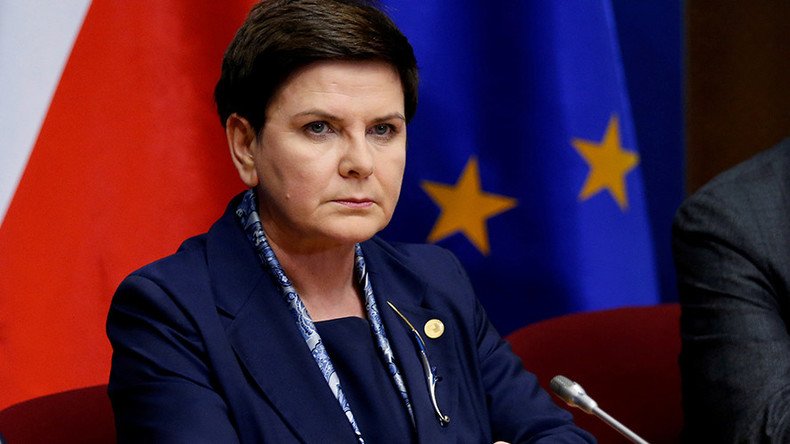Polish PM’s Auschwitz statement, perceived as anti-migrant, lands her in hot water

Poland’s prime minister, Beata Szydlo, has provoked a wave of indignation with her controversial statement made at the Auschwitz memorial being seen as defending the Polish government’s tough anti-migrant stance.
“In today’s restless times, Auschwitz is a great lesson showing that everything must be done to protect the safety and life of one's citizens,” Szydlo said during a ceremony marking the 77th anniversary of the first deportation of the Polish prisoners to the Auschwitz Nazi concentration camp on Wednesday, AP reports. June 14 is now marked in Poland as the National Day of Remembrance of Victims of German Nazi Concentration Camps and Extermination Camps.
Her statement then briefly appeared in a post on the Polish ruling Law and Justice (PiS) Party official Twitter page but was quickly removed, as it was widely understood as a remark defending the Polish government’s decision to reject the EU refugee resettlement plan and not to accept any asylum seekers from the Middle East and North Africa.
W tym miejscu #Oświęcim#Auschwitz Premier Beata Szydło: Chrońmy swój naród. Skandal. Wstyd na cały Świat. pic.twitter.com/Yc4Loa31dt
— barbara stempowska (@barbarastempows) June 14, 2017
Many critics considered the prime minister’s words “inappropriate,” given the location. Some people called her words “scandalous” and said that she “brought shame on herself in front of the whole world.”
Just when you think Polish government can't fall any lower Szydło makes cheap anti-refugee point during commemoration ceremony at Auschwitz
— Pawel Swidlicki (@pswidlicki) June 14, 2017
today in poland news: prime minister szydło using auschwitz to make a point about how refugees are bad and dangerous, somehow
— zmora z jeziora (@unhaunting) June 14, 2017
The European Council President and former Polish Prime Minister Donald Tusk was among those who condemned Szydlo’s words.
"Such words in such a place should never come out from the mouth of a Polish prime minister," Tusk said in his Twitter post.
Takie słowa w takim miejscu nigdy nie powinny paść z ust polskiego premiera.
— Donald Tusk (@donaldtusk) June 14, 2017
Grzegorz Schetyna, the leader of the opposition Civic Platform Party and the former Polish Foreign Minister, also expressed his resentment over the incident. “In Auschwitz, the symbol of Holocaust, one must bow the head and stay silent,” he said in Twitter, adding that Szydlo’s attempt to link the tragedy of Auschwitz to the current policies was “shameful.”
W Auschwitz, miejscu symbolu Holocaustu należy pochylić głowę i milczeć. Słowa PBS i wpisywanie tej tragedii do bieżącej polityki, haniebne.
— Grzegorz Schetyna (@SchetynadlaPO) June 14, 2017
Tomasz Siemoniak, a former Polish defense minister and deputy prime minister, also denounced Szydlo’s words, saying that it is “a disgrace on a global scale” and adding that the prime minister “completely lacks moral and intellectual qualifications” for her position.
Kompromitacja premier Szydło na światową skalę. Zupełny brak kwalifikacji moralnych i intelektualnych do funkcji. https://t.co/ML9Mjz0muR
— Tomasz Siemoniak (@TomaszSiemoniak) June 14, 2017
The prime minister’s words also quickly provoked a strong negative reaction on Twitter.
Some critics said Szydlo lacks intellect and morality, while others said that her words reflect her outright cynicism.
Szydło wie doskonale czym było #Auschwitz. Jej tekst obnaża bardzo niski poziom umysłowy i zerowe walory moralne.
— Paolo (@PaLejman) June 14, 2017
Meanwhile, #Poland PM Beata Szydlo was drawing parallels at an Auschwitz commemoration today. Cheap and ugly shots.
— Zselyke Csaky (@zecsaky) June 14, 2017
“Auschwitz is mostly a proof of the fact that hatred, racism, xenophobia and greed lead to hell on Earth,” one person wrote in response to Szydlo’s remarks.
Auschwitz to przede wszystkim dowód, że nienawiść, rasizm, dzielenie, chciwość, ksenofobia prowadzą do piekła na Ziemi. Szydło hańbi urząd!
— Tomek (@TomaszBona) June 14, 2017
Some people went further and asked if Szydlo was planning to create new concentration camps in Poland – this time for refugees. Meanwhile, other people even compared Szydlo’s rhetoric to Adolf Hitler’s.
Premier Szydlo chce robic obozy koncentracyjne dla uchodzcow?! pic.twitter.com/Stqo4Ly8dg
— Jan Osiecki (@josiecki) June 14, 2017
Polskie obozy śmierci?Nie drażnijmy przyjaciół z niemieckich mediów. Szydło o lekcji z #Auschwitz ? Tusk mówi o skandalu. Moralność sługusa.
— Wojciech Biedroń (@WBiedron) June 14, 2017
The scandal came as the EU launched legal action against Poland, Hungary and the Czech Republic for not “taking the necessary action” in dealing with migrants and refugees under the EU refugee resettlement plan.
The three EU states have acted “in breach of their legal obligations,” the European Commission said in a statement, explaining its decision.
In September 2015, EU ministers took up a plan to relocate over 100,000 migrants who have already reached the continent, throughout Europe. However, not all EU states have found the measures acceptable, saying that the migrant crisis cannot be solved through obligatory quotas.
Poland was among the states that have been opposing this plan from the very beginning. In total, nearly 21,000 asylum-seekers have been distributed throughout Europe since the launch of the relocation program, some 14,000 from Greece and the rest from Italy.
However, Poland has not yet accepted any refugees. In response to the European Commission’s latest move, Warsaw said it intended to carry on with its current migration policy and did not intend to accept its quota of refugees.
It is ready to defend its right to not take in refugees in an EU court, Polish Deputy Foreign Minister Konrad Szymanski told the Polish Press Agency (PAP) on Tuesday.












